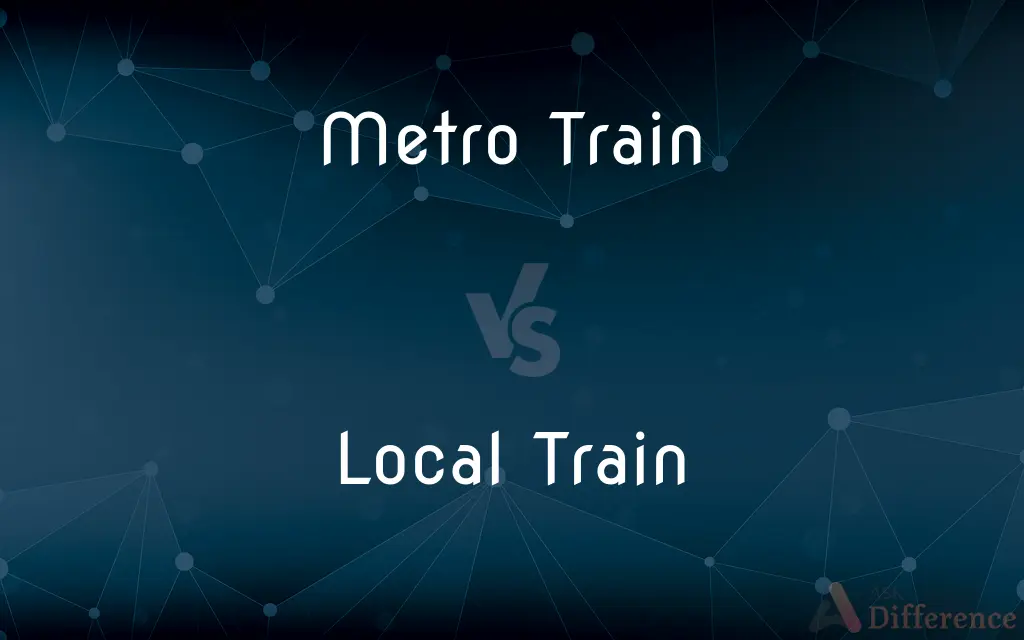Metro Train vs. Local Train — What's the Difference?
By Tayyaba Rehman — Published on November 20, 2023
Metro Train: fast, city-based, frequent stops; Local Train: slower, connects distant areas, infrequent stops.

Difference Between Metro Train and Local Train
Table of Contents
ADVERTISEMENT
Key Differences
The Metro Train, designed for intra-city travel, is a rapid transit system found in urban areas, often operating on its own dedicated tracks or tunnels, ensuring a timely commute. It's known for its frequency, speed, and capacity to handle high passenger volume during peak urban hours. Conversely, the Local Train, typically operating over longer distances, connects suburbs or cities and travels at a slower pace, stopping at numerous stations along its route, thus taking longer to reach a destination compared to the metro.
While the Metro Train services are usually standardized with a specific focus on consistency, punctuality, and high speed, making them a preferred mode of transport for daily city commuters, the Local Train tends to have varying schedules and classes, offering both slow and fast options depending on the distance and the stops involved. The local trains, unlike the metro, may not be as frequent, leading to issues with overcrowding and delays, especially in densely populated areas.
In terms of infrastructure, the Metro Train often boasts more modern amenities, such as air-conditioning, secure entry and exit points, electronic ticketing, and passenger information systems, providing a more comfortable and efficient riding experience. In contrast, the Local Train, serving longer routes, might lack some of these advanced features, focusing more on accessibility and affordability for the masses, often resulting in a compromise on comfort and convenience.
The pricing structure of the Metro Train is usually more standardized, with fares based on zones or distance traveled, and it's often more expensive, reflecting the speed and convenience it offers. The Local Train, however, generally has a lower fare structure, making it an economical option for passengers, especially those traveling longer distances or those for whom the cost of daily commuting is a concern.
Comparison Chart
Speed
High
Variable, generally low
ADVERTISEMENT
Area of Operation
Within cities
Between suburbs/cities
Frequency
High
Variable
Infrastructure
Modern
Basic
Fare
Higher, zone-based
Lower, distance-based
Compare with Definitions
Metro Train
Metro Trains have modern amenities for passengers.
He prefers the Metro Train because of its clean and air-conditioned environment.
Local Train
Local Trains often have varied schedules and classes.
He caught the late-night Local Train, which was less crowded than the daytime ones.
Metro Train
Metro Trains often run on dedicated tracks.
Thanks to its dedicated tracks, the Metro Train doesn't face traffic delays.
Local Train
Local Trains have more stops over longer distances.
The Local Train stopped at every small town along the route.
Metro Train
A Metro Train is a high-speed urban railway system.
She takes the Metro Train daily to avoid city traffic.
Local Train
Local Trains are an economical commuting option.
Traveling by Local Train is a cost-effective way to commute.
Metro Train
Metro Trains operate exclusively within a city.
The Metro Train has made commuting across the city effortless.
Local Train
A Local Train is a regional transport option connecting wider areas.
I used the Local Train to visit the neighboring city.
Metro Train
Metro Trains are characterized by frequent stops.
The Metro Train stopped at every station, making it convenient for various commuters.
Local Train
Local Trains cater to suburban and intercity passengers.
Every morning, workers board the Local Train to the city.
Common Curiosities
Are Local Trains suitable for long-distance travel?
Yes, Local Trains connect cities or suburbs, ideal for longer distances.
Do Local Trains provide different travel classes?
Yes, Local Trains often have various classes, from basic to more comfortable options.
Why are Metro Trains more expensive than Local Trains?
Metro Trains are priced higher due to faster service, modern amenities, and operational costs.
How frequent are Metro Trains compared to Local Trains?
Metro Trains usually offer higher frequency, especially during peak hours, compared to Local Trains.
What areas do Metro Trains primarily serve?
Metro Trains serve urban areas, facilitating fast intra-city travel.
Are there restrooms on Local Trains?
Yes, Local Trains typically have restrooms, especially since they cover longer distances.
Do Metro Trains operate late at night?
Service hours for Metro Trains vary, but major lines in big cities often run late.
What are peak hours like on Metro Trains?
Peak hours on Metro Trains are usually crowded, with high passenger volume.
How are Local Trains accommodating for persons with disabilities?
Local Trains usually have specific accommodations, but facilities can vary widely by location and system.
Can you transport heavy luggage on a Metro Train?
Metro Trains are more restrictive about heavy luggage due to space and security concerns.
How secure are Metro Trains?
Metro Trains generally have good security, with surveillance cameras and security personnel.
Can Local Trains be booked in advance?
Local Trains often don't require reservations, but it's possible on some intercity routes.
Is there dining available on Local Trains?
Some long-distance Local Trains offer dining cars or vendors, but it's not universally available.
Are pets allowed on Metro Trains?
Policies on pets vary; some Metro Trains allow them in carriers, while others have restrictions.
Are there women-only compartments on Local Trains?
Some regions offer women-only compartments on Local Trains for safety and comfort.
Share Your Discovery

Previous Comparison
Enlightenment vs. Great Awakening
Next Comparison
BPO vs. BPMAuthor Spotlight
Written by
Tayyaba RehmanTayyaba Rehman is a distinguished writer, currently serving as a primary contributor to askdifference.com. As a researcher in semantics and etymology, Tayyaba's passion for the complexity of languages and their distinctions has found a perfect home on the platform. Tayyaba delves into the intricacies of language, distinguishing between commonly confused words and phrases, thereby providing clarity for readers worldwide.














































